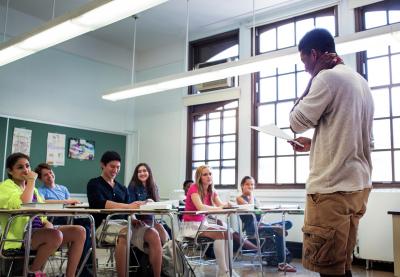Last month, I was fortunate to attend the Geraldine R. Dodge Poetry Festival in Newark, New Jersey. It was some of the best professional development—and frankly personal development—I have experienced in quite some time.
Billy Collins, former poet laureate of the United States, started off the festival by talking about a free program he created called Poetry 180. The project, hosted by the Library of Congress, is simple: Read one poem to your students each day of the approximately 180-day school year. Online, Collins provides a selection of 180 poems with high school students in mind. These are not poems to analyze or explicate, but rather poems that simply promote enjoying the spoken word. I loved the idea—and have started doing it with my classes.
Some of the poems are funny, others are shocking and still others are deeply moving, but their true magic lies in what they can offer as a whole. If read out loud on a daily basis, these poems have the power to challenge and expand students’ views about people and experiences different from their own.
I experienced this power myself: At the festival, I sat through two back-to-back sessions titled “Poetry Sampler,” in which the participating poets took turns reading a selection of poems. One by one, people of different genders, races, religions, ethnicities, cultures and political views took to the stage to share a bit of themselves. Each time, I was struck by how different the poets were from me, how different their experiences had been. Yet, I was also left with the feeling that I could identify with some of what they had expressed, that we shared something fundamentally similar.
One poem, incorporating bits of Spanish, recounted the loss of a father and had me thinking about my own dad’s encroaching dementia. There was a poem about a first kiss that each of my students could probably relate to in some way. Other poems spoke of sexual abuse, and had my students been in the audience, these pieces may have opened some of their eyes to the struggle and resilience of people who have survived a tragedy that often goes unspoken. Li-Young Lee read a poem about the need to find something good amid the realities of hunger, poverty and injustice. Aaron Smith shared a poem about growing up gay with a father who was the embodiment of stereotypical “manliness”—hunting and tractors, pocketknives and football. The way Nickole Brown talked about her dead grandmother’s penchant for cursing made the loss of her relative feel tangible to everyone there. She had us all thinking about those we have lost or fear losing.
Poetry offers quick access to a vast array of experiences. I could identify with some of the poems I heard that day as if they were telling my story; others opened my eyes to a cultural belief or experience that was not my own.
You don’t need to be a language arts teacher to take advantage of the opportunity Poetry 180 presents. Most of the poems can be read in a matter of moments. At the start of class or during the couple of spare minutes we often have at the end of class, we can offer our students a quick glimpse into a world broader than their daily lives and selves.
Perhaps your students will see a bit of themselves in some of the poems. Or maybe they will discover similarities with people who are different from them, which is one of the surest ways to teach acceptance and empathy.
Knoll is a writer and English teacher at a public school in New Jersey.


0 COMMENTS